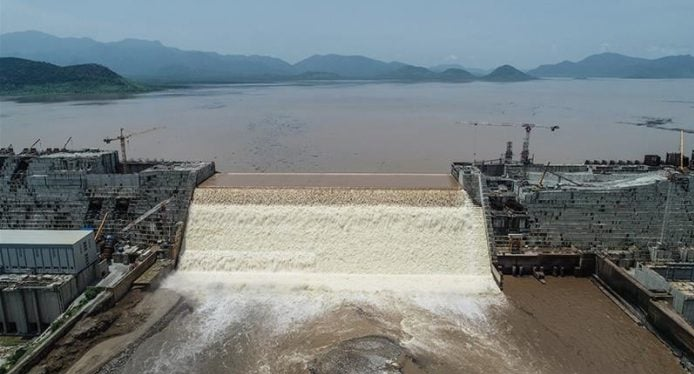Ethiopia Gains Diplomatic Victory at UNSC - ENA English
Ethiopia Gains Diplomatic Victory at UNSC

As the second phase of filling GERD is just at the corner, Ethiopia gains diplomatic victory at the UNSC
Another round of externalizing the issue of GERD and a conspiracy against Ethiopia’s legitimate right to use its water resources for the electrification of the country and sharing hydropower with brotherly African countries collapsed at the UNSC meeting a couple of days back.
Besides, the nation fought off unfounded accusations and one sided claims that tried to make Ethiopia responsible for everything under the sun regarding Tigray. The major powers and their media outlets which are serving as spokes office for the TPLF perpetrated reign of terror have been at least temporarily silenced by the persuasive power of the truth.
Ethiopia has always used professional diplomacy on the basis of the standard requirements for cooperation and amicable relations between sovereign countries but has unfortunately become a victim of double standards deliberately imposed on the country in the form of sanctions and diplomatic treachery by the US and its allies. The US put a terrorist organization on equal footing with a sovereign state trying to give orders to a full member of the UN as if it is one of its states.
Speaking on the recent UNSC session, Ambassador Taye Atske Selassie, Permanent Representative of Ethiopia to the United Nations remarked that “My country Ethiopia is undergoing a significant transformation that indeed requires delicate and context driven handling of complex domestic challenge.”
Despite the odds hatched by Egypt and Sudan, once again the UNSC had resolved that apart from encouraging the three countries to go back to the negotiating table, there is nothing more that the UNSC could do, effectively blowing out the ill-fated conspiracy of Egypt and Sudan as well as their supporters. Attempts to shame and blame Ethiopia for using its own river has always proved to be futile as the country still adheres to the major international laws governing Trans Boundary Rivers.
On the UNSC meeting, once more Ethiopia managed to effectively verify between its friends in need and its adversaries on this well established global council. Sudan and Egypt tried to rally the Arab League, individual EU and African countries, to stop not only the second filling of GERD but to stop the construction of Ethiopia’s flagship dam in its entirety. The former Trump Administration tried to force Ethiopia to sign a binding treaty prepared to rob Ethiopia of its rights to construct a dam on its own territory and river and even suggested that Egypt can bomb the dam itself.
Egypt and Sudan put the GERD case before the UNSC at least five times in the recent past but failed to gain anything as the time tests friends of Ethiopia, Russia, China, India and Kenya defended Ethiopia’s right to build its own dam and accepted the unilateral truce made by Ethiopia to facilitate relief supplies and peaceful farming season for farmers in Tigray. The representatives of the major western powers in the UNSC conspired to come up with some kind of resolution that would hamper Ethiopia’s right to construct GERD but failed as usual.
Egypt and Sudan lack no knowledge of the fact that GERD will not affect their share of water but were unable to accept Ethiopia’s rights to use its resources based on international laws regarding Trans Boundary Rivers. They still try to enforce colonial treaties to which Ethiopia was not a party. They chose diplomatic and possible military confrontation instead of cooperating with Ethiopia to facilitate regional economic cooperation in jointly utilizing the waters of the Nile.
Both countries need to accept the inevitability of the second filling of GERD and shift their focus from confrontation to economic cooperation that could benefit the three countries. For instance, scholars on the subject suggest that while Ethiopia would produce hydropower for the lower eastern riparian countries, Sudan can utilize its vast arable land for irrigation which would in turn promote food security for the growing population in the region.
Resources like Transboundary Rivers should not be mixed with narrow nationalism while economics should not be entangled with power politics which is based on irrational militarization which could only be a threat for the countries involved and larger Africa. Such economic cooperation should also be based on equity, mutual trust and promotion of peace than conflict. There are more than 250 Trans Boundary rivers in the world and many countries are working in cooperation to use these resources for their mutual benefit and Ethiopia’s Blue Nile is no exception.
Once again, Egypt and Sudan need to stop national chauvinism and try to cooperate with Ethiopia in the context of Agenda 2063 and ACfTA instead of focusing on Pan Arabism as a political agenda.
The population of the three countries needs to develop a regional master plan for the reduction of poverty in their respective countries and primarily focus on food security at household level. As it is repeatedly stressed by Ethiopia, GERD could be s springboard from which the three countries are expected public diplomacy in the context of people to people relations.